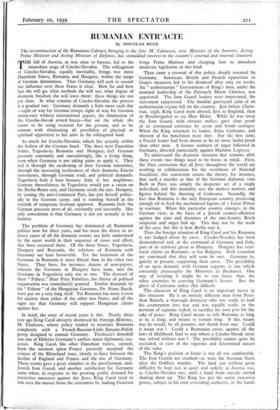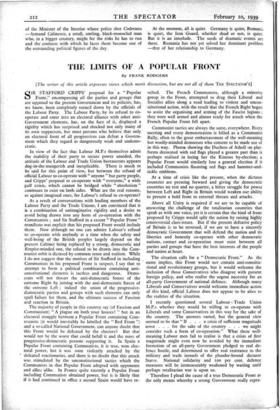RUMANIAN ENTR'ACTE
By DOUGLAS REED
The reconstruction of the Rumanian Cabinet, bringing to the fore M. Calinescu, now Minister of the Interior, Acting Prime Minister and Acting Minister of Defence, has stimulated interest in the country's external and internal situation.
THE fall of Austria, as was clear to foresee, led to the immediate siege of Czecho-Slovakia. The subjugation of Czecho-Slovakia, equally inevitably, brings two more Danubian States, Rumania and Hungary, within the range of German domination. That Germany will seek to extend her influence over these States is clear. How far and how fast she will go, what methods she will use, what degree of domestic freedom she will leave them : these things are not yet clear. In what remains of Czecho-Slovakia the process is a gradual one. Germany demands a little more each day —right of way for German troops, right of way for German motor-cars without international papers, the diminution of the Czecho-Slovak armed forces—but on the whole she seems to be using restraint for the present, and to be content with eliminating all possibility of physical or spiritual opposition to her aims in the subjugated land.
So much for Czecho-Slovakia, which lies actually within the hollow of the German hand. The three next Danubian States, Yugoslavia, Rumania and Hungary, feel German pressure constantly and unremittingly, like a living thing, even when Germany is not taking pains to apply it. They feel it through the awakening of their German minorities, through the increasing restlessness of their domestic Fascist movements, through German trade and political demands. Yugoslavia feels it least because Italy is her neighbour, German thrustfulness in Yugoslavia would put a strain on the Berlin-Rome axis, and Germany needs the axis. Hungary, by joining the anti-Comintern Pact, has put herself politic- ally in the German camp, and is sunning herself in the warmth of temperate German approval. Rumania feels the German pressure most of all, externally and internally. Her only consolation is that Germany is not yet actually at her frontier.
The problem of Germany has dominated all Rumanian politics now for three years, and has been the direct or in- direct cause of all the dramatic events, too little understood by the outer world in their sequence of cause and effect, that have occurred there. Of the three States, Yugoslavia, Ifungary and Rumania, the relations of Rumania with Germany are least favourable. Yet the treatment of the Germans in Rumania is more liberal than in the other two States. They have, for instance, dozens of newspapers, whereas the Germans in Hungary have none, and the Germans in Yugoslavia only one or two. The demand of their " Fiihrer," Herr Fritz Fabritius, for liberty of political organisation was immediately granted. Similar demands by the " Fiihrer " of the Hungarian Germans, Dr. Franz Basch, were put on a very long shelf. Yet Rumania has more reason for anxiety than either of the other two States, and all the signs are that Germany will support Hungarian claims against her.
In brief, the story of recent years is this. Nearly three year ago King Carol abruptly dismissed his Foreign Minister, M. Titulescu, whose policy tended to associate Rumania completely with a French-Russian-Little Entente-Polish group designed to contain Germany. Titulescu's downfall was one of Hitlerist Germany's earliest major diplomatic suc- cesses. King Carol, like other Danubian rulers, seemed, from the moment Allen France passively accepted the seizure of the Rhineland zone, clearly to have foreseen the decline of England and France and the rise of Germany. These events gave a great stimulus to the pro-German, anti- Jewish Iron Guard, and another satisfaction for Germany came when, in response to the growing public demand for restrictive measures against the Jews, King Carol tried to win over the masses from the extremists by making Octavian Goga Prime Minister and charging him to introduce moderate legislation of this kind.
Then came a reversal of this policy, deeply resented by Germany. American, British and French opposition to Goga's measures led to his dismissal after only six weeks. An " authoritarian " Government of King's men, under the nominal leadership of the Patriarch Miron Christea, was appointed. The Iron Guard leaders were imprisoned, the movement suppressed. The familiar graveyard calm of an authoritarian regime fell on the country. Just before Christ- mas, 1938, King Carol went abroad, first to England, then to Berchtesgaden to see Herr Hitler. While he was away the Iron Guard, with obvious malice, gave clear proof of its continued existence by arson and bomb outrages. When the King returned, its leader, Zelea Codreanu, and thirteen of his henchmen were shot. For the first time, a Fascist leader had been shown to be no more bullet-proof than other men. A furious outburst of anger followed in Germany, directed particularly against Madame Lupescu.
To understand the dramatic situation that remains after these events two things need to be borne in mind. First, the Nazi conviction that all Jews throughout the world are working in collaboration for the overthrow of National Socialism; this conviction rejects the theory, for instance, that such a murder as that of the German diplomat vom Rath in Paris was simply the desperate act of a single individual, and this mentality sees the darkest motives and figures behind the shooting of Codreanu. Secondly, the fact that Rumania is the only European country possessing enough oil to feed the mechanised legions of a Great Power in wartime. When this particular country emerges, in the German view, as the basis of a Jewish counter-offensive against the aims and doctrines of the anti-Semitic Reich suspicion and anger boil up. This may not be the truth of the case; but this is how Berlin sees it.
Thus the foreign situation of King Carol and his Rumania is one hedged about by cares. Czecho-Slovakia has been dismembered and, at the command of Germany and Italy, part of its territory given to Hungary. Hungary has terri- torial claims on Rumania; so has Bulgaria. Both countries are convinced that they will soon be met. Germany is, quietly at present, supporting their cause. The possibility of an open demand, with German support, is one which constantly preoccupies the Ministers in Bucharest. One way of averting it might be to run faster than the other countries in courting Germany's favour. But the ghost of Codreanu makes that difficult.
The character of King Carol is an important factor in this situation. He is an entirely different man from Presi- dent Benesh, a thorough democrat who was ready to lead his countrymen into war and was equally ready, in the moment of supreme ordeal, to sacrifice his own post for the sake of peace. King Carol means to rule Rumania as long as he is king, and means to remain king. If this meant war he would, by all portents, not shrink from war. Could it mean war ? Could a Rumanian crisis, against all the laws of likelihood, lead to war where a Czecho-Slovak crisis was solved without war ? The possibility cannot quite be excluded, in view of the vigorous and determined nature of this ruler.
The King's position at home is not all too comfortable. The Iron Guards are crushed—as were the Austrian Nazis after the Dollfuss murder. The land can without great difficulty be kept just as quiet and orderly as Austria was, as Czecho-Slovakia was, until a hand from outside started shaking them up. The King has put the entire executive power, subject to his own overriding authority, in the hands • of the Minister of the Interior whose police shot Codreanu —Armand Calinescu, a small, smiling, black-monocled man who, in a bigger country, might for the risks he has to run and the coolness with which he faces them become one of the outstanding political figures of the day. At the moment, all is quiet. Germany is quiet, Rumania is quiet, the Iron Guard, whether dead or not, is quiet. But it is an interlude. The seeds of dramatic events are there. Rumania has not yet solved her dominant problem —that of her relationship to Germany.















































 Previous page
Previous page